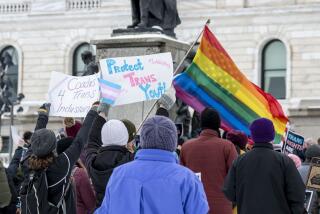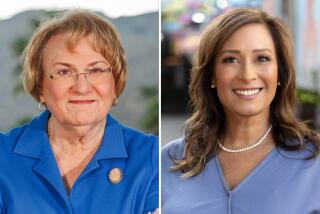Transgender, nonbinary pastor says, âLetâs make the tent as big and as open as we canâ
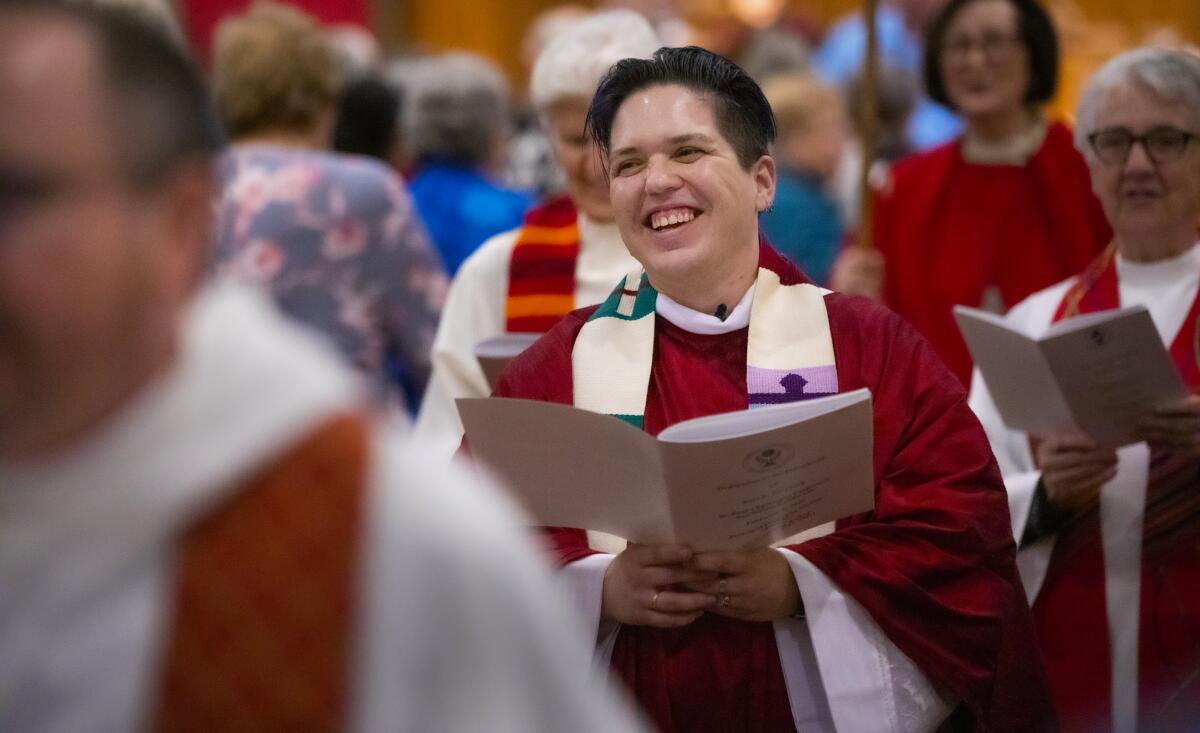
The Rev. Kori Pacyniak is believed to be the first transgender, nonbinary priest in the Roman Catholic Womenpriests movement.
SAN DIEGO â The conversation began in typical fashion, with a question many grandparents ask: âWhen you grow up,â Kori Pacyniakâs grandmother wondered, âwhat would you like to be?â
At that point, the chat took an atypical turn.
âI want to be a priest,â said Kori, then an 8-year-old girl from a devout Polish Catholic family.
Grandmother: âOnly boys can be priests.â
Kori: âOK, I want to grow up to be a boy.â
Now 37, Kori Pacyniak no longer wants to be male â or female. Pacyniak now identifies as nonbinary, someone who is not strictly feminine or masculine. (And someone who has abandoned gender-specific pronouns like âheâ or âsheâ in favor of the more inclusive, if sometimes confusing, âthey.â)
While Pacyniak left behind standard gender roles, the youthful fascination with the priesthood never faded. On Feb. 1, Pacyniak was ordained a priest in the Roman Catholic Womenpriests movement.
The Rev. Kori Pacyniak is now pastor of San Diegoâs Mary Magdalene Apostle Catholic Community, a Serra Mesa church that preaches âA New Way to be Catholic.â For this parish, Pacyniak also represents a new way, as they are believed to be the first transgender, nonbinary priest.
Founded in 2005 by Jane Via and Rod Stephens, Mary Magdalene celebrates Mass with a liturgy that, aside from some tweaks in the wording, would be familiar to most Roman Catholics. The church is not recognized by the San Diego Diocese, however, and the Vatican has excommunicated several of the women ordained in what has become a global movement.
Mary Magdalene now has about 120 registered parishioners; 60 to 70 regularly attend 5 p.m. Sunday Mass at the churchâs temporary home, Gethsemane Lutheran Church. Most in the congregation were raised as Catholics, yet were disillusioned by the churchâs refusal to ordain women. Even among these believers, though, there was some initial hesitation about a nonbinary cleric.
âFor some congregants,â said Esther LaPorta, president of Mary Magdaleneâs board, âI think at first it might have been something to get used to.â
Among those who have had to adjust: Via, the 73-year-old pastor emeritus.
âIâm struggling to refer to Kori as âthey,ââ Via said. âWhen there is a single person and we know that is just one person, well, Iâve never used the word âtheyâ for a single person. I know Kori gets frustrated with me at times.â
Usually, though, the priest responds to this confusion with a charitable laugh.
âThis is hard?â Pacyniak said. âLearning to spell my last name as a child was hard. Welcome to my world!â
A restless search
Kori Pacyniak grew up in Edison Park, a neighborhood on Chicagoâs North Side. The tightly knit Polish community shared a common language, customs and beliefs. Friends, neighbors and family, Koriâs comrades in the Polish Scout troop and Polish folk dancing troupe â all were Catholic.
Like many children, Kori daydreamed about careers. Some days, the goal was to become a Navy SEAL. On other days, a professional soccer goalie. Or a Catholic nun. Always, though, there was the hope that the impossible dream Kori had shared with a grandmother would, somehow, become possible.
âAs they went through college and started studying theology, this really became a topic of conversation,â said Basia Pacyniak, 67, Koriâs mother. âIt was very much what Kori wanted to do.â
Majoring in religious studies and Portuguese â âno employable skills,â Kori cracked â the undergraduate came out as bisexual. Pacyniak was still searching, though, still examining gender identity and career paths. Although president of Smithâs Newman Assn., an off-campus Catholic organization, Pacyniak was frustrated by the churchâs positions on women and sexuality.
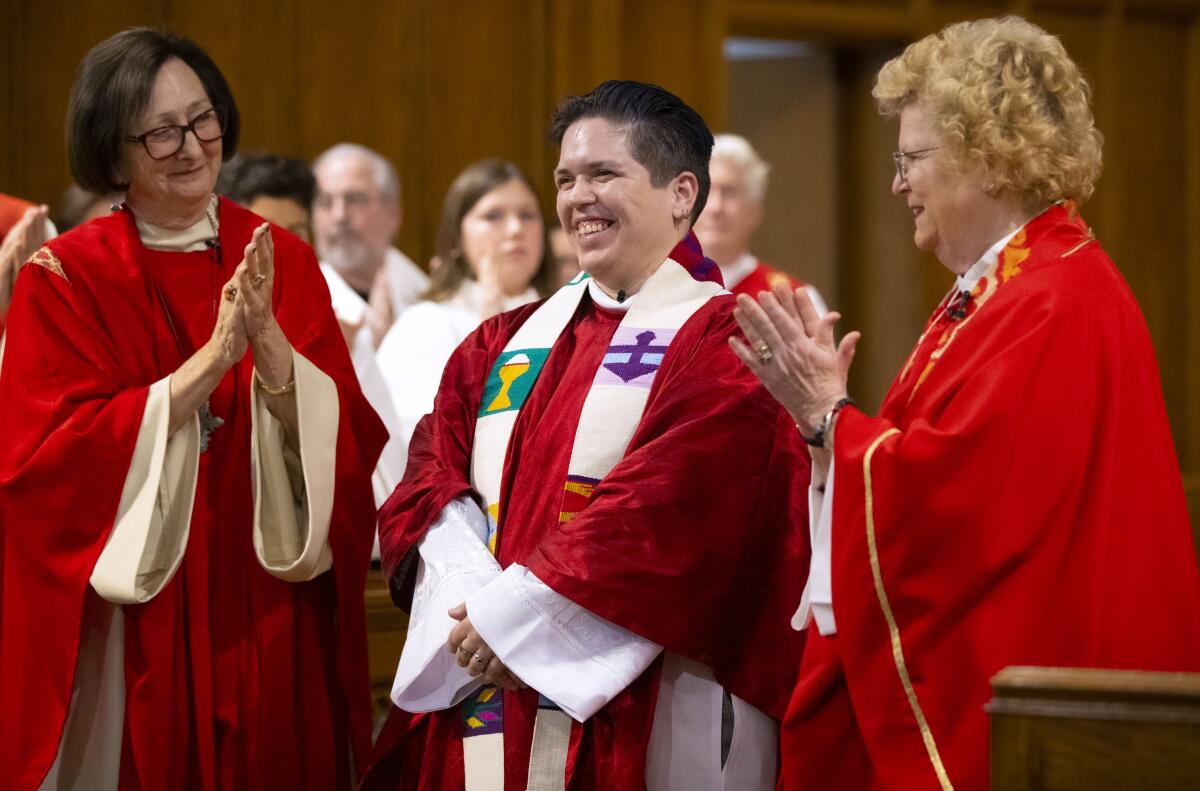
âOther people wanted to become president,â Pacyniak said. âI wanted to overthrow the Vatican.â
This restlessness continued post-graduation. After an administrative job in Los Angeles, Pacyniak enrolled in Harvard Divinity Schoolâs masterâs degree program. The new grad student came out as transgender and started to identify as male. This venture into masculinity was brief and unsatisfactory.
âI realized that box was just as restrictive as female,â Pacyniak said. âNeither male nor female identification works for me.â
For a time, Pacyniak considered converting to a church that, while similar in some ways to Catholicism, ordains women and welcomes LGBTQ clergy. Again, though, something didnât seem quite right.
âI thought that might be my church home,â Pacyniak said of the Episcopal Church. âBut am I too Catholic to be Episcopalian?â
Yet Catholicism posed barriers to Pacyniak. For one thing, Rome recognizes only two genders, male and female. And...
âRight now,â said Kevin Eckery, a spokesman for the Roman Catholic Diocese of San Diego, âordination is only open to natural-born males.â
Pacyniak completed studies at Harvard, and later enrolled at Boston Universityâs School of Theology. There, Pacyniak studied how to minister to LGBTQ military service members in the years following the repeal of the âdonât ask, donât tellâ policy.
But in 2016, a friend forwarded a job listing. Mary Magdalene needed a pastor. Candidates didnât have to be ordained, if he, she or they were willing to work toward ordination.
In January 2017, Pacyniak began serving as Mary Magdaleneâs pastor.
âQueer theologyâ
The Rev. Caedmon Grace is a minister at the Metropolitan Church of San Diego, a church that grew out of the LGBTQ community. Even here, there are ongoing discussions about the language of worship.
Consider John 3:16. A familiar New Testament verse, itâs often translated as âFor God so loved the world, that he gave his only begotten Son...â
âOur practice in the MCC is to use inclusive language,â said Grace. âSo that has become âFor God so loved the world that God sent the begotten one.â Weâre not identifying God as male or female.â
This may not be the translation heard in most Christian churches, yet the emerging field of âqueer theologyâ questions many of the assumptions of traditional religious prayer and practice.
âWe have to get out of the hetero-normative lens we use for understanding everything,â said Pacyniak, who is completing a doctorate in UC Riversideâs queer and trans theology program. âWe have to make trans and queer folks see themselves as part of the liturgy.â
Even at Mary Magdalene, a church that prides itself on its inclusive nature, this requires some work. When Pacyniak arrived, the liturgy included a line, âWe believe that all women and men are created in Godâs image.â
âThis is great,â Pacyniak told Via after Mass. âBut for people who donât identify as women or men, that doesnât work.â
The line was rewritten: âWe believe that all people of all genders are created in Godâs image.â
Creating a âspiritual support communityâ for trans and nonbinary people is a key goal of Mary Magdaleneâs newly ordained priest. So is reaching out to the congregationâs men and women.
âLetâs make the tent as big and as open as we can,â Pacyniak said. âItâs an ongoing opportunity. Donât get too comfortable; have conversations with people on the margins.â
All in good time
Through this past January, Via assisted Pacyniak on the altar during Mass. The new pastor studied, learning theology, liturgy and administrative duties, before being ordained as deacon in June 2019 and then, on Feb. 1, as a priest. More than 100 attended the ordination, so the ceremony was moved from Mary Magdaleneâs small space to the soaring Gothic sanctuary of St. Paulâs Episcopal Cathedral.
The pews held Pacyniakâs parents, Basia and Bernard; brother, sister-in-law, two nephews and several cousins; friends from high school, Smith, Harvard and Boston University; plus dozens of congregants from Mary Magdalene.
âKori is very open and kind,â said Carol Kramer, who has attended Mary Magdalene for a decade. âI think theyâll be a really good pastor.â
Pacyniak is a pastor and a student of queer theology, yes, but so much more: a baseball fan â with shifting allegiances, from Cubs to Red Sox to Padres â a regular Comic-Con attendee and, this priest insists, a Catholic. This brand of Catholicism may not be recognized by the Vatican, but that doesnât bother Pacyniakâs parents, who remain practicing Roman Catholics.
âWe are very proud of Kori,â said Basia Pacyniak. âThe movement and the community is very welcoming, very open, and we are very supportive of that community. I feel that it is not in conflict with the Catholicism that we practice.â
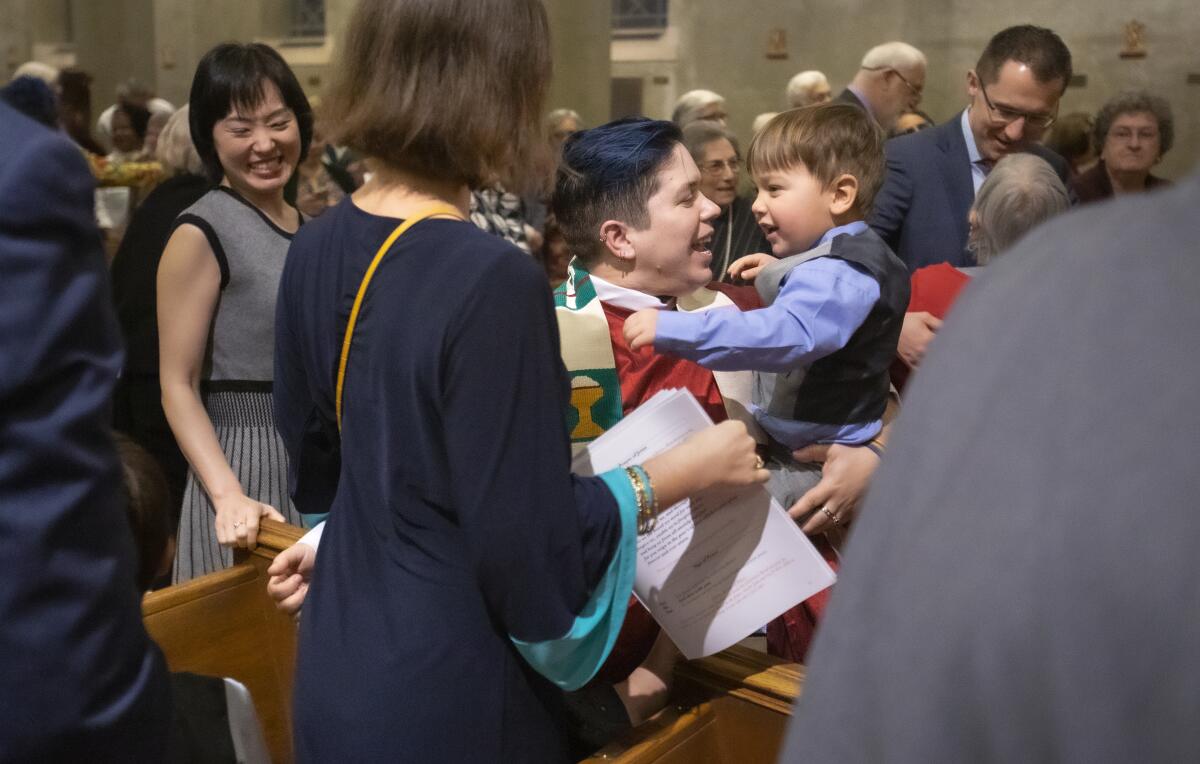
The Pacyniaks foresee a day when their church will include female priests. Give it time, counseled Bernard Pacyniak, 66.
Lots of time.
âI imagine,â he said, âin 100 years this will all be part of one organization.â
Rowe writes for the San Diego Union-Tribune.
More to Read
Sign up for Essential California
The most important California stories and recommendations in your inbox every morning.
You may occasionally receive promotional content from the Los Angeles Times.
